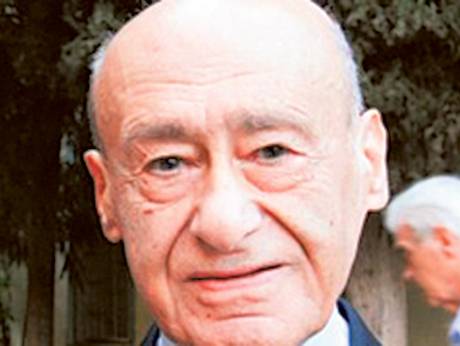
by Joseph A. Kechichian
Beirut: Fouad Boutros, a leading civil servant who served Lebanon under presidents Fouad Shehab, Charles Helou and Elias Sarkis, and who filled the critical foreign policy portfolio at the height of the Civil War between 1976 and 1982, died at the age of 98.
Born on November 5, 1917, the highly respected attorney was one of Shehab’s proteges, which is why he was known as a ‘Shehabist’. As such, he worked tirelessly to forge a unique Lebanese identity in a country where sectarianism ruled.
Elected deputy in 1960 to one of the Greek Orthodox posts for Beirut, he served in parliament for a single four-year term. Boutros, the scion of a leading Beiruti family, was appointed deputy prime minister in 1966, and again in 1968 as well as 1976-1982, and held a variety of ministerial posts, most notably as Minister of Planning (1959-1960); Education (1959-1960); Tourism (1968); Defence (1966-1976, 1978); and Foreign Affairs (1968, 1976-1982).
Much like Charles Malek, the man who defined Lebanese diplomacy and placed the country on the international map after he co-authored — with Eleanor Roosevelt — the United Nations Universal Declaration of Human Rights, Boutros made critical contributions at the height of the Civil War when he opted moderate positions far from the militia leaders and feudal lords. As a result, he often played mediating roles between different parties, capable to speak for Lebanon whenever possible and to the Lebanese when circumstances required it. Long before the 2005 Cedar Revolution, Boutros acted as a negotiator between the Maronite Patriarchate and President Bashar Al Assad, which lowered tensions even if the Syrian occupation lingered. In 2001, and following a call by Cardinal Mar Nasrallah Boutros Sfeir for Syrian troops to leave Lebanon, Fouad Boutros engaged in one of his most critical mediation efforts, though his endeavors came to naught after Damascus refused to loosen its grip on the country.
In 2005, Prime Minister Fouad Siniora appointed him head of the National Committee to Reform the Electoral Law, which was composed of leading academics and jurists. The committee presented its draft in June 2006, and recommended that a mixed system be devised between the majority and proportional representation models along with the adoption of a modern and transparent electoral monitoring mechanism that included a 30 per cent quota for women candidates on various electoral lists. Although the new electoral law intended to get the country out of its political quagmire, the Boutros initiative fell victim to the July 2006 war between Israel and Hezbollah, which further polarised Lebanese society.
No hybrid measure stood a chance against the winner-takes-all system in place, as local intransigence prevailed.
President Michel Sulaiman recognised Fouad Boutros’s immense contributions in 2011 when he awarded the diplomat the Grand National Order of the Cedar, for “great services rendered to Lebanon”.



